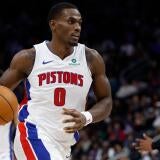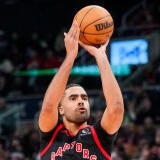Lakers reportedly want career-ending injury exception on Luol Deng's salary, but are facing an uphill battle
The Lakers probably aren't getting this exception, but technically, it's a matter of interpretation on the NBA's part

Luol Deng hasn't played for the Lakers since Oct. 19, 2017, but for the next several weeks, he is perhaps the single most important player to their offseason plans. The Lakers signed Deng to a four-year, $72 million contract in 2016. In 2018, they used the stretch provision to waive that contract and spread the remaining cap hit over several years. The Lakers still owe Deng $10 million, which is split into $5 million increments over the next two seasons and is guaranteed to be paid to Deng no matter what, but according to The Athletic's Shams Charania, the Lakers have requested a career-ending injury application in the hopes of clearing that money off of their cap sheet.
Why does that matter? There are two major reasons, one for each of the next two offseasons:
- If the Lakers want to use the Non-Taxpayer Mid-Level Exception on a free agent this offseason, they would be hard-capped at the luxury tax apron, which was $138.9 million last season. That exception would allow the Lakers to sign a starting-caliber player in free agency. Last season, the first-year salary of that exception was just under $9.3 million, whereas the Taxpayer equivalent was only around $5.7 million. Assuming a new max contract for Anthony Davis and a frozen cap, the Lakers would enter the offseason with around $102.1 million committed (including their first-round pick). That is almost $37 million below the potential hard cap, money that vanishes quickly with a Mid-Level Player and a new contract for Kentavious Caldwell-Pope. Clearing $5 million would allow the Lakers far more flexibility in finishing off its roster around those two signings.
- The Lakers intentionally signed players to short-term contracts in 2019 with the intention of keeping their cap clean for 2021 and a potential run at Giannis Antetokounmpo. Given the pandemic's impact on that cap, it would have been nearly impossible for the Lakers to get to true max space in 2021 with Deng on the books. LeBron James has a $39.2 million player option, Anthony Davis, on the second year of a max contract, would be at around $35.3 million, and Deng is still stuck on the books at $5 million. That's $79.5 million for three players, only two of which actually contribute. Throw in around $10 million on Incomplete Roster Charges, and the cap would need to come in at around $125 million for the Lakers to have any chance at true max space, and that's with literally every other player off of the books (which won't happen either). If Deng is cleared, though, there might be a more feasible scenario in which James, Davis and Antetokounmpo (or another potential third star) all leave a bit of money on the table. It's not likely, but it's worth considering.
So those are the stakes here. The more pertinent question is, how likely is it that the Lakers actually succeed in getting this career-ending injury waiver? The answer is... not very, but it's possible.
On paper, the Lakers have two major obstacles to overcome here. The first is that it isn't fully clear what injury the Lakers are referring to. Deng had surgery for a pectoral injury in May of 2017, but he reportedly suffered the injury before the 2016-17 season and played through it. At the time, however, he told Tania Ganguli of the Los Angeles Times that he was playing less in order to both prevent future injury and allow more developmental minutes for the younger Lakers.
"We just kind of all agreed that with 19 games, if I go out there and let's say, God forbid, something happened," Deng said. "The whole point was play the young guys [and] actually see what they could do in the summer with me and everything. If I was to get injured or anything, it would be a lot harder and it would defeat the whole purpose of me not playing 60-something games."
When he joined the Minnesota Timberwolves for the 2018-19 season, he was hampered by injuries to his foot. Most notably, he missed games due to an Achilles issue, but the exact nature of that injury is unclear. That is the second obstacle for the Lakers. Deng went on to play 22 games for the Timberwolves. It would be hard to argue that Deng suffered a career-ending injury with the Lakers when his career literally did not end with the Lakers. He went on to play for another team.
Technically, though, those Minnesota games do not exclude the Lakers from applying for this exception. So long as the player in question played in 25 or fewer games elsewhere, the former team can still legally apply for this waiver, according to Article VII, Section 4(h)(3) of the Collective Bargaining Agreement. Deng's 22 games with the Timberwolves come in just under that line. Their more tangible impact was delaying the Lakers from seeking this relief out, as teams cannot submit a career-ending injury application until one year after a player has played in their final game.
Section 4(h)(5) lays out the most important detail of this application for the Lakers. "Only the Team with which the player was under contract at the time his career-ending injury or illness became known or reasonably should have become known shall be permitted to apply to have the player's Salary excluded from Team Salary pursuant to this Section 4(h)." In simpler terms, this means that the Lakers need to argue that the injury in question occurred while Deng was a Laker. Considering we don't know what exactly the injury here is, it's hard to say whether or not they will be successful in that endeavor.
Even if they are, there is still the matter of whether or not the injury itself is career-ending. This is not a determination that the NBA itself gets to make. Instead, either a physician jointly approved by both the league and the NBPA or a Fitness to Play panel including one physician appointed by each side and a third appointed by the first two physicians. Section 4(h)(2) lays out the three possible criteria by which that physician or panel could consider the injury career-ending:
- "The player has an injury or illness that prevents him from playing skilled professional basketball at an NBA level for the duration of his career."
- The player has an injury that "substantially impairs his ability to play skilled professional basketball at an NBA level and is of such severity that continuing to play professional basketball at an NBA level would subject the player to medically unacceptable risk of suffering a life-threatening or permanently disabling injury or illness."
- "The player has an injury or illness that would create a materially elevated risk of death for the player."
Unless there is critical information that we are not yet aware of, the last two categories probably aren't in play here. They are reserved for players like Chris Bosh and Mirza Teletovic, who had life-threatening conditions involving blood clots that they could not play through, as the medication involved in managing those conditions created other possible health risks that would have been exacerbated by playing. Therefore, we're likely leaning on the first category here, meaning that the physician or panel will need to find that Deng's injury prevents him playing NBA-caliber professional basketball anymore.
Again, this is a tough sell considering Deng's stint in Minnesota. All things considered, he played decently enough there. He reached double-figures as a scorer in seven out of the 22 games, and while he wasn't the same lockdown defender he once was, he at least managed to hold his own on that end of the floor. It's far likelier that Deng, now 35-years-old, simply aged out of being an effective NBA player.
Ultimately, though, it will come down to what the doctors determine, and they have a recent history of being somewhat forgiving when it comes to vague injuries. The Orlando Magic were granted a waiver on the final $16.7 million owed to Timofey Mozgov in 2019 due to an unspecified knee injury. Ironically, the Lakers originally signed both Deng and Mozgov in the summer of 2016 to contracts that would become among the worst in all of basketball. It would be somewhat fitting for both of those contracts to end with the same career-ending injury waiver, but considering how little we know about any precedent Mozgov may have set, it should still be considered extremely unlikely. It is a worthwhile shot for the Lakers to take. There's no harm in sending the application, but they should expect to have Deng on their books for the next two seasons.


















